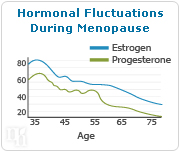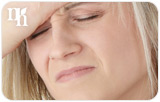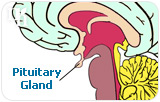You may be one of the many menopausal women who experience shifting moods during menopause: you go from “feeling normal” to feeling angry, irritated, or upset in the blink of an eye. For women going through menopause, mood swings are one of the most difficult symptoms to deal with. Compounding the problem is that few understand the cause of this symptom and how to prevent it.
Fortunately, the source of mood swings isn't a mystery. The symptom stems from hormonal imbalance, the hallmark of the menopause transition. Keep reading to learn more about how natural hormones affect mood swings during menopause.
How Are Natural Hormones and Mood Swings Related?

Underneath all of your menopausal symptoms is a hormonal imbalance. Estrogen and progesterone - two of the hormones responsible for emotional balance, among other things - begin to fluctuate rapidly with the onset of menopause, before beginning a long, steady decline. Unfortunately, your moods fluctuate with these changes, leading to the sudden shifts that are all too familiar to women going through menopause.
How Can I Control Menopausal Mood Swings?
The most effective way to control mood swings during menopause is to target this symptom at its source: hormonal imbalance. Most experts agree that a combination of lifestyle changes and alternative medicines are the healthiest and often best way to balance hormonal levels.

Lifestyle changes encompass the whole spectrum of daily decisions that affect your overall health and well-being. To improve your health - and by extension, your hormonal production. Try to improve your diet, and make sure to exercise at least once a day. Also, stress is a leading trigger of many menopausal symptoms, including mood swings, so consider incorporating more stress relieving activities into your daily life, such as taking time out to do yoga, meditation, or breathing exercises.
Alternative medicine includes a range of herbal supplements, including estrogenic herbs and non-estrogenic herbs. Estrogenic herbs contain phytoestrogens, a compound thought to mimic estrogen in the human body. However, these are thought to cause side effects linked to estrogen dominance. Non-estrogenic herbs are known to stimulate the body's hormonal production naturally by nourishing the endocrine system, without the unpleasant side effects.
Talking to a Doctor
As always, it is best to speak with a qualified medical professional before embarking on a treatment regimen for your menopause symptoms. If lifestyle changes and alternative medicines are ineffective, it is especially important to speak with a doctor about your options.


